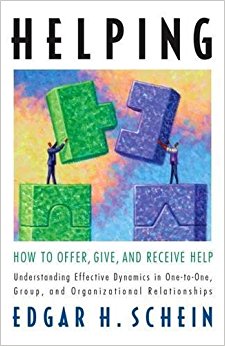Helping
Why these books?
Edgar Schein has been a giant in the field of OD for years. Instead of writing a summary of three books, I decided to combine three of his last books. These books offer examples of real organizational issues. In his last book he adds Lessons Learned, which are really beneficial to reflect on our work as consultants. I believe you will see several connections with Stakeholder Centered Coaching from the father of Organizational Development. As Peter Block (2011) said in a recent book, we all owe a debt of gratitude from Edgar Schein and his work in helping organizations be better.
Schein, Edgar. (2009). Helping. San Francisco: Berrett-Koehler.
Helping is a basic relationship that moves things forward. Help is only help if it is seen as help. We know from our experience that for help to be given, AND accepted, the client and the coach must willing to engage in the conversation. ‘Trust is must’ between the helper and the client.
We all need help because most of the time we cannot accomplish our goals and jobs without others. If we can do it alone, we wouldn’t need coaches, feedback, or organizations. Completing tasks require communication that is often times reciprocal. Many times, reciprocity is affected by our history with family, friends, and the organizations we work in. In most cases, new relationships require trust building which will depend on previous experiences. Without a baseline of trust, help will be slow or limited.
Five possible traps for the client
- Initial mistrust. Will the helper be willing and able to help? Such caution is normal and appropriate but may cause the client to hide the real problem at first. …
- Relief. Having finally shared the problem with someone else who may be able to help, the client certainly feels relieved. Along with that often comes a welcome sense of dependency and subordination …
- Looking for attention, reassurance, and/or validation instead of help. …
- Resentment and defensiveness. The client may look for opportunities to make the helper look inept. …
- Stereotyping, unrealistic expectations, and transference of perceptions. … the client calibrates everything the helper does against these expectations and judges the quality of the growing relationship on this basis rather than on the help given.
Six possible traps for the helper
- Dispensing wisdom prematurely.
- Meeting defensiveness with more pressure.
- Accepting the problem and over-reacting to the dependence.
- Giving support and reassurance.
- Resisting taking on the helper role.
- Stereotyping, a priori expectations, ‘counter-transference,’ and projections.
Five things the helper does not know at the beginning
- Will the client understand the information, advice, or questions being asked?
- Will the client have the knowledge and skill necessary to follow the helper’s recommendations?
- What is the client’s real motivation?
- What is the client’s contextual situation?
- How do clients’ experiences shape expectations, stereotypes, and fears?
The helper can choose to be an expert who provides information, a doctor who will diagnose the problems and prescribe a solution, or a process consultant who will focus on the relationships and specify what kind of assistance will help.
Principles and Tips:
Principle 1: Effective help occurs when both giver and receiver are ready.
Principle 2: Effective help occurs when the relationship is perceived to be equitable.
Principle 3: Effective help occurs when the helper is in the proper helping role.
Principle 4: Everything you say or do determines the future of the relationship.
Principle 5: Effective helping starts with pure inquiry.
Principle 6: It is the client who owns the problem.
Principle 7: You never have all the answers.
Helping lays the ground work for his next book, Humble Inquiry, where Schein focuses on questions rather than answers. How do we get the most ideas for possible solutions? Itzak Rabbi, Nobel Prize for physics, said one of the reasons he thinks he has been successful was because of his mother. When he came home from school she didn’t ask, ‘what did you learn in school today?’ Instead, his mother asked him, “Izzy, what good questions did you ask in school today?” Dr. Rabbi said the focus of his responsibility was on asking questions and to be curious, were the foundation his own learning.

